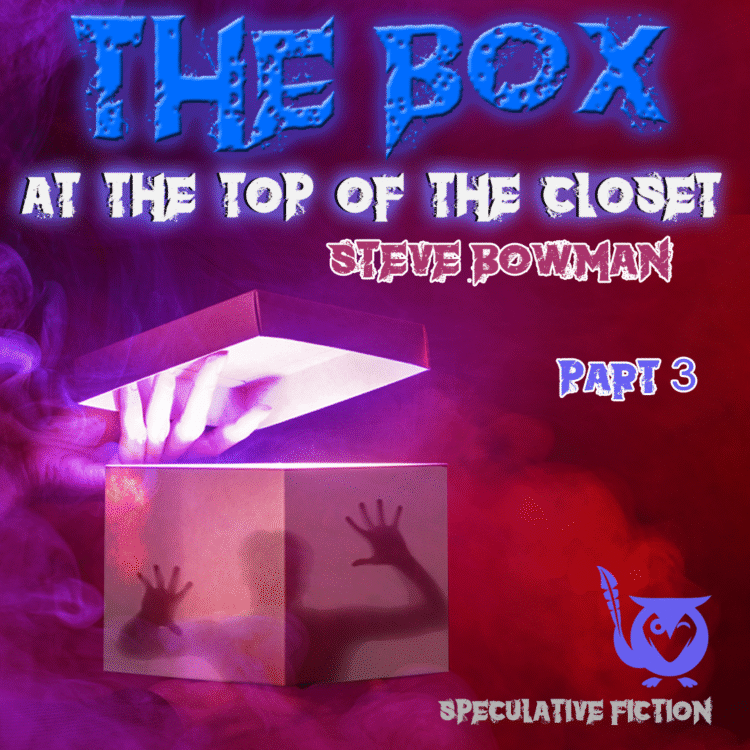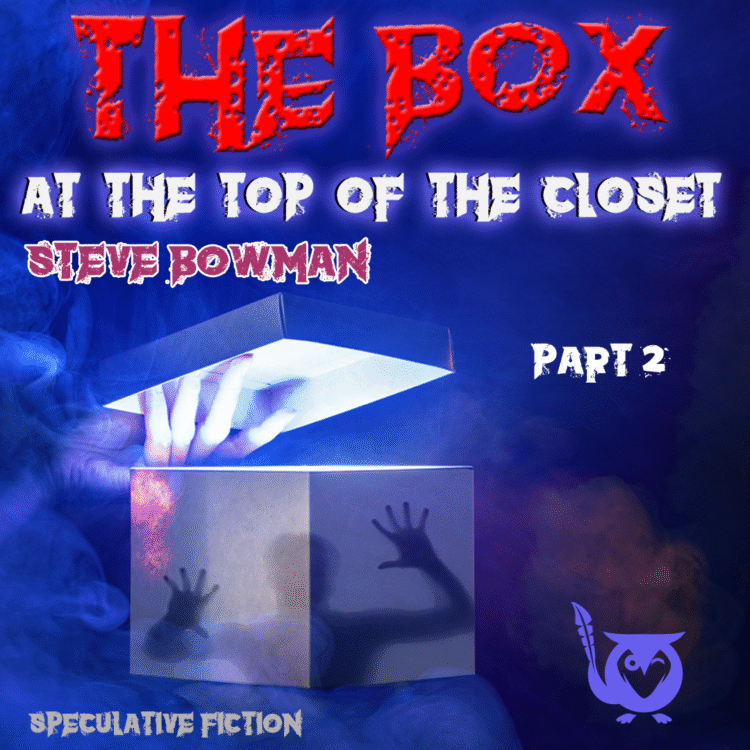Dedicated to my mother Laverne,
who never let me quit something just because it was difficult.
Trigger Warning: This piece contains violence, mental health trauma, and animal harm. Sensitive readers should exercise caution.
Eric couldn’t remember what caused him to look up there — maybe a random cleaning, maybe looking for a piece of luggage — but he regretted what he found at the top of the closet forever after.
His discovery replayed during random daydreams. Sometimes he’d wake up in the morning feeling like he’d dreamed about it. And sometimes the thought popped into his head while shopping or out at dinner: Was it still there? Was it right where he left it?
He always meant to check when he got back home, but somehow it would slip his mind, or he thought of something else he needed to do more. Yet he knew he felt better, more certain, whenever he was home, instead of being out and imagining it was gone.
Home was comforting in an enslaved kind of way, but Eric didn’t mind its invisible chains. The freedom of being out with friends or at work began to grow overwhelming, yet he had to keep the homelights on and pay the mortgage.
Anything, any little discomfort he endured, now went toward ensuring that it was safe, that it was still there. But was it there? He’d remind himself to look, but then found himself in the basement sorting the old lawn decorations he’d inherited from his grandma.
Grandma. She’d died five years ago, and not long after that, he’d found it. There it had sat, as if it had been there since he’d bought the house. But that couldn’t be — there was nothing in the house before he’d moved in. He’d checked everywhere, fearful of potential squatters.
He’d seen a show about them. How they’d hide like overgrown insects, then come out to eat your food, read your books, watch your tv, and use your toilet while you were gone — leaving everything in perfect order before you returned. So he’d climbed on chairs to look in all the high places, and he’d gotten down on his hands and knees to look into all the low places.
Nothing. Nothing whatever. Until after Grandma died.
At Halloweentime he thought he could hear it. Like bees buzzing under thick glass. Like a humming mumble. He could almost feel it. He took to looking forward to the experience, as if a beloved family member were coming for a visit. One day, he even found himself putting new sheets on the guest bed and spreading pillows he didn’t remember buying.
That first time he paused, sheet in hand, trying to remember or understand, but then he shrugged and finished the task. It made him more comfortable, more certain. So he kept doing it every year. Sometimes he’d check the bed to see if there were any sleep indentations: Always none, but he looked any time he remembered.
By the second week of November, the buzzing mumbles would fall silent. Eric would wash the bedclothes with a kind of heartache. Maybe next year, he’d tell himself.
But for weeks after, he’d still dream of it. He would be up at the top of the closet, beneath the bright white bulb, holding it. Black and small, the box fit in one hand comfortably, so that he could turn it with the other hand to admire all its shiny square faces. But it had heft.
For some reason in those moments, he remembered a dog he’d once known, and how it had been a comfortable weight in his hands: warm, alive, caring. But then he would jerk awake as if he’d been shouted at, and a loud, echoey scream would reverberate in his ears for hours after.
Other nights, he would dream things he didn’t want to name, things that his Catholic schooling had taught him were bad: hurting people with sticks or knives; pushing people down stairs or off balconies; dragging people through the darkness outside to bring them to the bright white closet in his house.
During that month of dreams, Eric asked it questions.
What is your name?
Where were you born?
What is your favorite food?
What does your family do?
He would hold it, be comforted by its weight and shiny black faces, and ask his questions. He’d do it all night long in the bright white light at the top of his closet of dreams.
Years of Novembers were lost in this dreamland, and except for those occasional admonitory screams, the box stayed silent — warm and comforting, but silent. The questions and silence had become part of the comfort for Eric, his raison d’être, and one year he laughed at that old bit of French from his college days.
At one time, he’d known the entire vocabulary, and how to make the sounds of all those frustratingly silent letters.
Silent letters…
Maybe there had always been answers to his questions, but he had forgotten how to listen. He decided to reteach himself. When December finally rolled around, he searched for all his old French textbooks and workbooks — he’d never properly organized his bookshelves when he’d moved.
He spent the winter recopying the workbook exercises so he didn’t have his previous answers in front of him. He would reteach himself how to listen to and speak Silence.
Eric spent the spring and summer pouring over his books and notecards. He even managed to pique the interests of his coworkers enough that they quizzed him with the notecards and read his essays to suggest improvements. It surprised him to find so many who could read and speak the Silence.
But a sudden numbness came over him when they called it French and fell to reminiscing about their study-abroad trips from their college days. Their voices cascaded into a dull roar, and he felt out of place, uncomfortable, and alone once more. So he decided he had sufficiently re-mastered his skills, and stopped seeking them out.
He let them re-fade into the background of his workdays and, once again, longed for the evenings and weekends as the long, hot days of summer approached fall.
When Halloweentime rolled around that year, Eric found himself dressing the guest bedroom again. He seemed to wake, as if from a dream, his eyes widening as he saw the bright red sheets and pillowcases. In years past, his hands had reached for the subdued plaids or blues, sometimes gray.
Perhaps the change represented his excitement or celebration for all his practice with Silence that summer. Eric gave a bemused smile as he finished making the bed.
The table-runner of fancy, beaded sugar skulls decorating his kitchen table gave him another start. Its turquoise and magenta beads iridesced in the yellow kitchen light. And a carved jack-o-lantern sat on his porch, smiling a toothy, candle-lit grin.
Eric had no recollection of these preparations, but there they were, as if someone had swooped in and decorated his house while he had been gone at work. He turned all the lights on, electric bill be damned, and didn’t sleep for a week after that. It reminded him too much of secret squatters crawling through the shadows of his house.
The great mumbling buzz came and went once again. The guest bed went unslept in; Halloweentime ended; and the great, dreaming November began. The first week went by without incident — Eric was still spooked by the thought of squatters, but he tried to master his fear enough to speak the Silence and listen for replies.
After several nights, he began to feel silly, self-conscious even, like people were watching him and laughing. On the worst nights, he laid in bed and cried himself to sleep. He felt stupid and resented having spent so much time relearning the language.
By mid-month, he was sitting in the closet every night, almost out of habit, as if it was expected of him. On one of those nights, when he had become so withdrawn that he nearly nodded off, he wondered aloud, “Why am I putting myself through this?”
And instantly, his head filled with a blinding vision.
Eric saw a body on a hillside above an ocean. But the body wasn’t his — he seemed to float beside it, pulled by invisible threads. He watched it, tall with shaggy brown hair so unlike his smartly parted, straight blond hair. The body turned from the ocean view and walked through the grass back to some pavement and what looked like a series of man-made mounds.
To Eric they looked a little like the flood walls or Indian mounds he’d visited in childhood, but longer. Much longer. One had a recessed terrace around it and a bunker-like entrance. An old iron door stood there, pushed halfway inwards, inviting. He walked forward, noticing that the iron door and cement awning above it had been painted white.
But the paint was old and cracking away in places, revealing rust on the door and old graffiti on the cement.
Through the entrance was darkness — deep darkness. Eric didn’t want to enter, but the body walked on, pulling Eric with it. It pushed the door fully open and stepped inside.
People Eric hadn’t noticed until now stepped into the doorway and called out, “Are you sure about this? I don’t think it’s a good idea.”
And the brown-haired, blue-eyed body answered, “It’s ok. I’m gonna walk through and find the other side. It can’t be far.”
He didn’t wait for a reply; he kicked a drink can and chip bag out of the way and walked into the darkness. At first the bright sunlight outside illuminated the walls. They looked white or gray, with ghostly hints of more graffiti.
The body walked on and the light dimmed more, until Eric could barely see his feet. The walls seemed to curve toward the right, and the light disappeared behind the bend. Still, he kept walking.
True darkness. He’d read about it before, the kind of darkness that happens in caves. And it came with a weight, like a pressure. He didn’t feel like he’d walked down a decline, but his ears popped.
This is what true blindness must be like, Eric thought. He wondered if he was still beside the body and strained to see it in the darkness. He stretched his arms out in front of him, feeling the darkness settle about him like cool, unmoving air. But as he pawed at it, he could have sworn that it separated in front of him like heavy cloth and folded back on itself.
Eric wanted to turn back, but the body walked forward again. The darkness was never-ending; it brushed against him with cold, pressing hands, squeezing him, kneading him. The body kept walking, but Eric didn’t want any more. He thrashed awake to find himself flat on his back in bed in a pool of sweat, his arms reaching out to the air above him.
He didn’t go to the closet the next night, but he woke up there the following night. He sat there in the bright white on the shelf at the top, cross-legged as if in a meditative pose.
The box was sitting on the shelf space in front of him, turned like a diamond so that three of its shiny black faces stared up at him. He suddenly wondered, for the first time, just how big this closet was — how big must the shelf be to hold him, and with room to spare!
Then it happened again.
He seemed to start where he had left off, in complete darkness with the tall, brown-haired body again. The body moved forward, and Eric scowled, dreading another night of endless, thick darkness.
But the darkness changed.
The air became less heavy, less tight. He heard crickets beginning to chirp and watched a skyful of stars twinkle into view. Then he felt something heavy in his hand and looked down to see that he was holding an old wooden baseball bat — so old, the wood had chips in it and all the writing had long since rubbed off.
Eric felt himself fully integrate with the shaggy-haired man. Sight and sensations merged. The bat was heavy. He watched himself rear it straight over the back of his head, then swing it down with an almighty smack against the concrete below.
Except it wasn’t concrete.
Eric heard something whimper and saw spikey fur. He glanced down to get a better look. It was an opossum, curled in the fetal position, with its claws gnarled at strange angles, like it was trying to grasp something or push it away.
The baseball bat hadn’t hit concrete at all — he had hit this opossum’s head.
He felt a big hand shove his shoulder. “Hit it again! Kill that damn thing!”
Eric turned and saw a middle-aged man with a mustache strangely cut into a squarish shape, like a Hitler mustache. But this wasn’t Hitler — this man wore a white t-shirt and boxer shorts. He shouted at the body like it was his son.
“Do it again, damn it!” the man screamed. “Kill that fucking thing! Can’t you hear the dog barking? Do you want to lose your dog? The neighbor will make us get rid of it if it keeps barking every night. Kill this motherfucker so the dog stops barking!”
Eric reared the baseball bat up for another swing, but when it came down, it was not the opossum’s face he saw on that ground. It was the dad’s face. And it wouldn’t die. The poor thing kept squirming on the ground, hit after hit.
And the dog barked louder and louder from somewhere across the dark yard. And the father kept cussing and yelling.
And Eric jolted awake, thrashing in a pool of sweaty sheets.
To be continued in Part 2…
Eager for more? Read these pieces next!
- Transcendence – Poetry
- My Grandmother’s Hands – Book Review
- Prize – Flash Fiction
- The Never – Dark Poetry

Steve Bowman
Steve Bowman’s work has previously appeared in The Legacy, Amarillo Bay, The Zen Space, Last Leaves, Southern Arizona Press, and Wicked Shadow Press. When not writing, Bowman seeks inspiration in the trees and hills of Southern Indiana with his little dog, Grummle.






1 Comment
[…] story is part of a three-part series. Read Part 1 […]